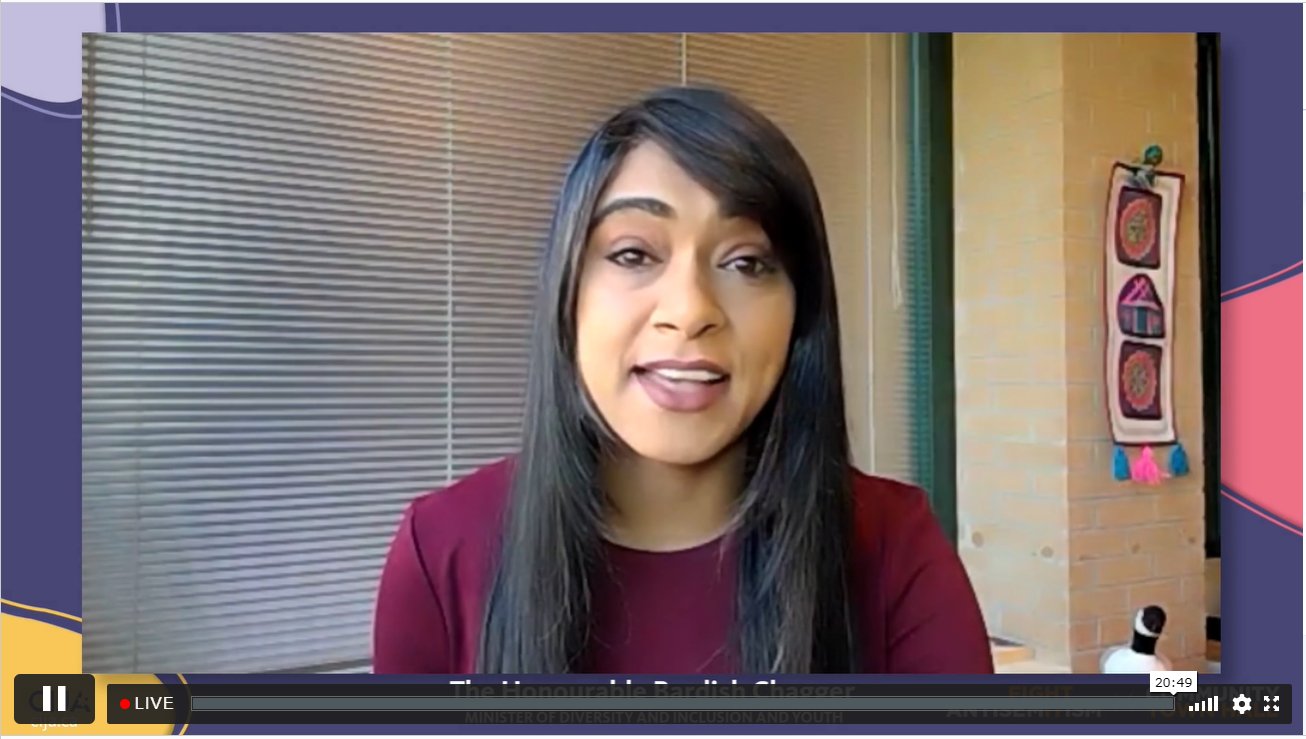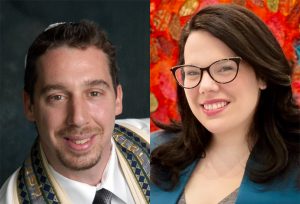Action over words is needed most at next week’s National Summit on Anti-Semitism, hosted by the federal government.
That was the consensus at a July 14 town hall on the lead-up to the summit. Hosted by the Centre for Israel and Jewish Affairs (CIJA), the virtual meeting drew about 1,300 Canadian Jews, some of whom expressed outright fear at spiraling anti-Semitism in their communities and on campuses.
The July 21 summit, and one on Islamophobia the following day, were announced earlier this month by Bardish Chagger, Minister of Diversity and Inclusion, in the wake of a surge in anti-Semitic incidents this spring and the hate-driven murder of a Muslim family in London, Ont.
Addressing the town hall, Chagger listed Liberal achievements on fighting anti-Semitism, including Canada’s adoption in 2019 of the International Holocaust Remembrance Alliance (IHRA) working definition of anti-Semitism, and the appointment last November of former justice minister and human rights advocate Irwin Cotler as Canada’s first Special Envoy on Preserving Holocaust Remembrance and Combatting Anti-Semitism.
In a statement announcing the summits, Chagger said invitations to attend were extended to her cabinet colleagues, members of Parliament, “and officials throughout all orders of government to hear directly from Muslim and Jewish community leaders.”
The meetings will assemble “a diverse group of community and political leaders, academics, activists, and members with intersectional identities within these communities.”
Both summits will be held virtually and will take place “in a closed door environment to ensure the safety of those participating,” a spokesperson for Chagger told The CJN.
Live-streaming details had not been confirmed by July 13, and a list of invitees had not yet been finalized, the spokesperson said, adding, though, that the federal Anti-Racism Secretariat is working directly with “community stakeholders,” while Chagger is working with MPs “to ensure a wide range of voices are represented” at the summit.
Cotler, who will co-chair the national summit with Chagger, pulled no punches at the town hall, warning of an “old-new, global, escalating, virulent, sophisticated, and even lethal anti-Semitism” that reached “a tipping point” during the Israel-Hamas war in May.
He pointed out that last year saw the highest levels of anti-Semitic hate crimes since being measured, and that those numbers have already been eclipsed this year.
He cited “incendiary” anti-Semitic hate on social media, where in one week this past spring, there were 17,000 tweets saying “Hitler was right,” or some variation of that.
This makes the national summit “as timely as it is necessary.”
Cotler said the framework for an action plan would have to include a mandate to teach about the Holocaust and anti-Semitism in public schools; the need to enhance the adoption and implementation of the IHRA definition of anti-Semitism; the importance of fighting all hate crimes; holding social media platforms accountable for their content; zero tolerance of anti-Semitism in any political party; and to “appreciate that Jews alone cannot fight anti-Semitism. We need a constituency of conscience and of action.”
The summit will provide “not only an opportunity to address anti-Semitism in words, but it must be what it is intended to be: an action summit, where words are translated into action, and not as a one-time (event) but as an ongoing combating of the scourge of anti-Semitism.”
An informal poll conducted during the town hall suggested that most respondents believe Jewish university students will feel excluded when they return to class this fall.
Another poll during the town hall suggested that 25 percent of respondents said the rise of anti-Semitism here has caused them to consider leaving Canada, while a third question revealed that 39 percent of those answering said they have recently removed outward signs of their Jewish identity, such as Stars of David and kippot.
One participant spoke of keeping his passport up to date and handy just in case, while others wondered about the role governments can play in fighting anti-Semitism.
In his remarks to the town hall, Shimon Koffler Fogel, CEO of CIJA, noted that what distinguishes the challenge Jews face is that they face hatred “from all sides”: the far left, far right, and from segments of the Muslim community.
“We have to challenge where necessary. We have to educate where the opportunity exists. But what we cannot do is surrender. We cannot be passive,” Fogel said.
The national summit’s focus will be on security and public safety, education, and “civil society—issues of inclusion, acceptance, of not invalidating or delegitimizing the Jewish lived experience. We want the capacity to take increased ownership of our own institutional and community safety and security,” said Fogel.
He also hopes the summit will lead to a national campaign to enhance social media literacy.
What’s most important, he said, is to see all levels of government work together to combat anti-Semitism.
The “unprecedented” summit is not the end of the process, Fogel said. “If anything, it is simply the beginning.”
B’nai Brith Canada said it has received ideas for discussion at next week’s summit. They include:
- Combating anti-Semitism must go beyond the principles enshrined in the federal Anti-Racism Strategy;
- An emphasis on the importance of fostering Jewish life in Canada, recognizing the historical and contemporary contributions of Canadian Jews;
- Promoting positive narratives about the contribution of the Jewish community to Canadian society;
- Recognition that new forms of anti-Semitism are distinct from the traditional anti-Semitism to which Canadians are more accustomed;
- Acknowledgement that anti-Zionism is a main driver of the new anti-Semitism and must be vigorously countered;
- A commitment to mainstream the fight against anti-Semitism across all federal departments and agencies. This would include the Canadian Human Rights Commission and, by extension, involve provincial human rights commissions;
- A commitment to create a National Holocaust, Genocide, and Anti-Semitism Advisory Commission;
- A commitment to implement the IHRA definition of anti-Semitism (and the IHRA definition of Holocaust denial and distortion) in a meaningful way and to actively promote adoption by the provinces/territories and municipalities;
- And a commitment to convening a special forum and ongoing dialogue with the Council of Ministers of Education Canada (CMEC) to work with schools to develop effective methods to combat anti-Semitism.
In a statement, Michael Levitt, CEO of Friends of Simon Wiesenthal Centre, also stressed that it’s important the summit “leads to real action, not words, including clear and defined next steps and funding to support initiatives to combat Jew-hatred, whether it’s in education, law enforcement, social media or another area.”
The town hall took place just as the Inter-Parliamentary Task Force to Combat Online Anti-Semitism released an interim report on how social media giants should handle online hate. (Read more about it in Janice Arnold’s story for The CJN.)







